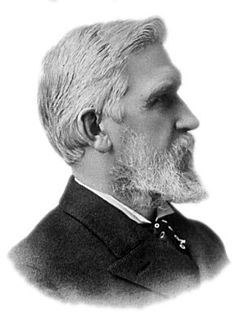A Quote by Andrew Carnegie
Nothing tells in the long run like a good judgment, and no sound judgment can remain with the man whose mind is disturbed by the mercurial changes of the stock exchange. It places him under an influence akin to intoxication. What is not, he sees, and what he sees, is not.
Related Quotes
The artist should paint not only what he sees before him, but also what he sees within him. If, however, he sees nothing within him, then he should also refrain from painting that which he sees before him. Otherwise, his pictures will be like those folding screens behind which one expects to find only the sick or the dead.
The problem with every judgment of sexual behavior is that it is made by people who aren't being stimulated as they are making the judgment. A jury that sees a woman in a sterile courtroom, asks her what she wanted, and then assumes that anything else she did was the responsibility of the man is insulting not only the woman but the power of sex.
On reflection, moral judgment in the arts appears rather as a tribute to their power to influence emotion and possibly conduct. And reflecting further on what some critics do today, one sees that a good many have merely shifted the ground of their moralism, transferring their impulse of righteousness to politics and social issues.
This is the gist of all worship: to be pure and to do good to others. He who sees Shiva in the poor, in the weak, and in the diseased, really worships Shiva. And if he sees Shiva only in the image, his worship is but preliminary. He who has served and helped one poor man seeing Shiva in him, without thinking of his caste or creed or race or anything, with him Shiva is more pleased than with the man who sees Him only in temples
When the uncultured man sees a stone in the road it tells him no story other than the fact that he sees a stone ... The scientist looking at the same stone perhaps will stop, and with a hammer break it open, when the newly exposed faces of the rock will have written upon them a history that is as real to him as the printed page.
Learning is a good medicine: but no medicine is powerful enough to preserve itself from taint and corruption independently of defects in the jar that it is kept in. One man sees clearly but does not see straight: consequently he sees what is good but fails to follow it; he sees knowledge and does not use it.
One of the bigger mistakes of our time, I suppose, was preaching the demonization of all judgment without teaching how to judge righteously. We now live in an age where, apart from the inability to bear even good judgment when it so passes by, still everyone, inevitably, has a viral opinion (judgment) about everything and everyone, but little skill in good judgment as its verification or harness.
Reelfoot is, and has always been, a lake of mystery.In places it is bottomless. Other places the skeletons of the cypress-trees that went down when the earth sank, still stand upright so that if the sun shines from the right quarter, and the water is less muddy than common, a man, peering face downward into its depths, sees, or thinks he sees, down below him the bare top-limbs upstretching like drowned men's fingers, all coated with the mud of years and bandaged with pennons of the green lake slime.


































